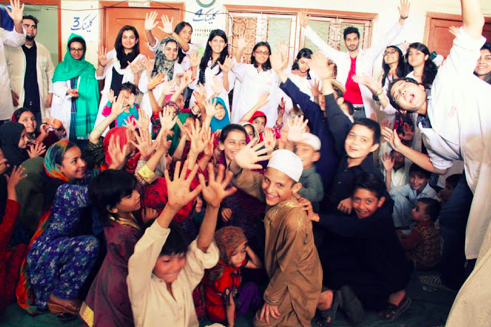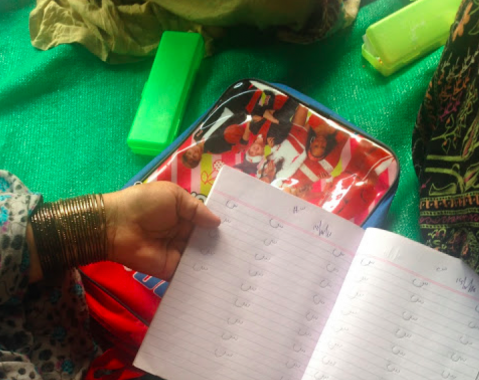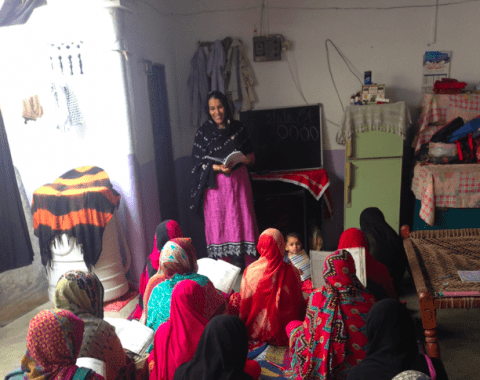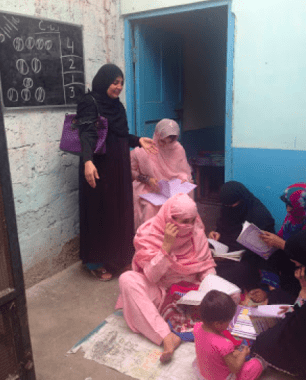The Ripple Effect: 144 Women Empowered, 13 New Community Leaders
Monday, January, 7th, 2019 News
By Zainab Faiza
Two years ago in April 2016, I was interviewed by a Talloires Network secretariat staff member as a finalist for for the 2016 MacJannet Prize for Global Citizenship for our work in Sikanderabad, a squatter settlement near Ziauddin University in Pakistan.
The Director of Students Affairs, Mr. Raza Abbas, nominated the program for the MacJannet Prize. From a global pool of about 50 nominations, 10 were selected to advance to the next stage which involves personal interviews with program leaders. My Skype interview lasted almost an hour – there was so much to say!
Glushan-e-Sikanderabad, home to 130,000 residents from all ethnicities of Pakistan, including thousands of Afghan refugees, is the place where people relocate to with hopes of a better life. The average number of children per household is seven and the families on average earn less than Rs.10,000 a month. The two sides of the settlement are bordered by large water bodies of sewage. The houses with electricity face about eight hours of daily power cuts. The residents have to purchase water from hydrants daily because they do not have access to a clean water supply.

Since 1996, Ziauddin University has provided medical consultation and medicine for a minimal fee at the Primary Healthcare Center (PHC) in Sikanderabad. The Department of Family Medicine, which is run under the supervision of Dr. Jawaid Usman, conducts clinics and ensures all children are vaccinated based on WHO’s Expanded Program of Immunization. Free of cost medicines are provided to treat tuberculosis, hepatitis C and asthma. In addition to health-related work, the center also conducts computer literacy classes and sewing courses for women to empower and train them to become financially independent.
I have been involved with the Sikanderabad community since my first year as a medical student at Ziauddin University. I was involved with a student-run organization called, KaraHealth Welfare Organization. Karahealth organized awareness camps in the community that included workshops on hygeniene and preventable disease like tuberculosis, hepatitis, malaria and others. When I began my fourth year of medical school, I was elected to be the president of the organization and subsequently decided to focus all of my energy to improving and expanding the organization.
The MacJannet prize money has been used to support the program and we have received anonymous donor funding to continue our mission. In this way, the MacJannet Prize has created ripples that continue to impact the community and the women in it. Educating one woman and informing her about healthy habits means one family will face less disease and live a better life.
We are grateful to the Talloires Network for encouraging us to do more in the community. As the teacher and female leader, Shehla Baji, says, “I do not understand a person who eats three full meals a day and fails to notice that their neighbor is hungry.” She hopes that people stop living in their bubbles and take a moment to look around them to notice that there are always people around who need help but are may be shy to ask for it.
To know more about our work you can follow our blog: sikanderabadhlp.blogspot.com
What happened since we won the MacJannet Prize?
 We recognized that to help the women of the community they needed access to education, but there was no school for adult women. With funds from the the MacJannet Prize, we were able to open five different “schools” for 2 hours each day which ran simultaneously in 5 different blocks in the community. We started with Urdu and Mathematics because knowledge in these subjects would facilitate their daily work. The curriculum we used is specially designed and tailored for people who have never attended school. After learning for two hours a day for 90 days the women are able to read an Urdu newspaper, write a letter and do everyday math.
We recognized that to help the women of the community they needed access to education, but there was no school for adult women. With funds from the the MacJannet Prize, we were able to open five different “schools” for 2 hours each day which ran simultaneously in 5 different blocks in the community. We started with Urdu and Mathematics because knowledge in these subjects would facilitate their daily work. The curriculum we used is specially designed and tailored for people who have never attended school. After learning for two hours a day for 90 days the women are able to read an Urdu newspaper, write a letter and do everyday math.
A central goal of the program was to keep it entirely community oriented. The teachers that taugh the classes were from the community and were trained and supported by university students and staff. The women attending the classes were from all age groups. Each student was given school supplies to use for during class and to take home for homework. The schools were equipped with an attendance register, mats, black board, fan, dustbins and watercoolers.
Student Success Stories
 Safiya
Safiya
Safiya is a 40 year old woman and a teacher in one of the schools in the first session. She also opened her home to host the classes. She said she felt proudest when she would see her students graduate. Her students keep in touch to let her know that they are able to do things they could not do before, like manage household expenses. Zahida, a thirty five year old woman and one of her students, loved to be called to the blackboard. She would dance back to her chair after she answered the questions.
Shakira
Shakira is a a 25 year old student who caught my attention from the start. She had attended school in the village before she got married at 13 years of age but could not continue her studies when she came to the city. Prior to attending the classes she could not read properly but now she reads the daily newspaper. She loves to read cooking recipes and makes her favorites for her famiy on special occasions.
 Jantaba
Jantaba
Jantaba, a 30 year old student, told me how she used to set up a small stall outside her house to sell chips and candies. On most days she would end up losing potential profit because she did not know how to add and subtract properly and would return excess change. Since attending the classes, she is making a profit. Her new math skills also allow her to understand the rates when she goes to buy chicken at the store.
Another 16 year old student said that her father now allows her to accompany her mother to the market without him because she can read the bus numbers and navigate her environment independently.
Shehla Baji
The backbone of the entire program is the 32 year old Shehla Baji who is from the area. She has been an employee of the Family Medicine department at PHC for more than fifteen years. Shehla Baji says the prize has helped her fulfill her dream of providing education to those who do not have access to it and she will forever be grateful for it. A lot of university students join her for various sessions to these schools where they talk about health and hygiene and tips for disease prevention. Many university students also chip in to pay school fees of children enrolled in the private schools in Sikanderabad. To me, she is a super human and I am so grateful that she is my friend. She has a great work attitude and she has an unwavering commitment to improve the community around her.